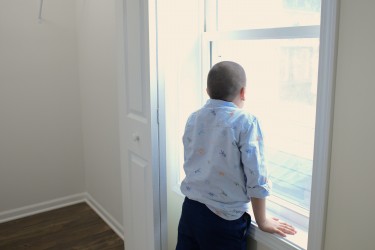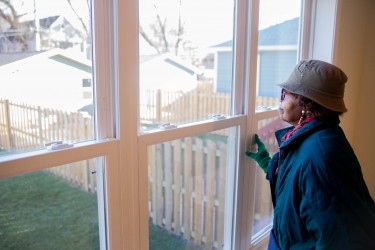HOUSING AND HEALTH DURING COVID-19: RENTAL EVICTIONS
This article is a part of our Housing and Health during COVID-19 series. Others in the series include: Affordability, Housing Conditions, and Community Conditions.
Housing payments are often the largest monthly expense for a household. Within Cook County, over half of all renters and the majority of low-income households spend more than 30% of their income on housing each month, putting them over the threshold at which they are considered rent-burdened.¹
So, what happens when a housing market that’s already built on shaky ground gets hit with a pandemic? COVID-19 caused a loss of income for many households that were already rent-burdened, which in turn has affected their ability to make monthly housing payments. This has led to a sharp increase in the number of households facing missed payments and outstanding rent, putting them at risk for eviction.
A Glance at the Numbers: September 2020
>> According to a recent study from Apartment List, nearly one third of US renters started September with outstanding back rent owed, a number that remained nearly unchanged from August.
>> In September, 8.5% of renters (that’s 2.82 million households across the country) missed, delayed, or made reduced rent payments.²
To stem a seemingly inevitable tidal wave of evictions due to missed payments, the federal government has taken certain steps to help support households across the country, including stimulus initiatives and protections under the CARES Act. Additionally, many state and local governments have enacted protections and issued financial aid to households struggling to make rent. Let’s take a look at what this looks like at each level.
US (national)
In early September, the Center for Disease Control and Prevention (CDC) issued a national moratorium on evictions to stabilize renters during the pandemic. Under this national order, renters must fill out and sign this form for their landlord to establish that they are unable to make rent due to the pandemic. These protections will keep many renters from facing eviction until December 31, 2020, though it’s important to note that the order does not supersede state or local orders, which might provide stronger protections for households.
Illinois
Back in March, Governor J.B. Pritzker issued an eviction moratorium in response to the pandemic. This state-wide order covers all residential properties and has been extended regularly throughout 2020, with the newest extension set to expire on December 12, 2020.
Chicago
In June, Mayor Lori E. Lightfoot signed the COVID-19 Eviction Protection Ordinance, which will kick into gear when the state-wide moratorium ends, protecting renters for an additional 60 days. Under this ordinance, renters will have more days to negotiate with their landlords (12 instead of 5), and landlords will be required to work with the renters to establish a repayment plan that will give the renters at least two months to re-pay missed rent. The ordinance regulates the interest and fees that a landlord can charge in response to missed rent, and the tenant and landlords are required to make a good-faith effort to reach an agreement.
To qualify for protections under this ordinance, tenants who receive an eviction notice from their landlord must provide written notice and proof that they are unable to make rent due to COVID-19 related reasons. You can find more information in several languages here.
What you can do if you’re at risk for missing a payment
We recently asked Samantha Alvarez at the Center for Changing Lives, a financial opportunity center in Chicago, what advice she has for someone at risk of missing a housing payment. She said,
“Be proactive. Communicate with [landlords and property managers] and let them know as soon as possible that you've been financially impacted by COVID-19. Ask what options do they have for you? Is there a forbearance you can request? Can fees be waived? If you are applying to [an] assistance program like the ones we offer at Center for Changing Lives, let your landlord know right away. This will show them that you are doing your utmost to honor your payments to them. In the event your landlord is not willing to work with you, we recommend reaching out to your local legal aid or housing advocacy office for assistance like the Lawyers' Committee for Better Housing or Legal Aid Chicago to see what your legal options are moving forward.”
The need for affordable housing
This pandemic has repeatedly brought to light the importance of, and increasing need for, housing and shelter that is affordable. When housing costs are affordable, households are able to put more money toward things like health care and long-term savings, and when something like COVID-19 comes along, they are better equipped to adjust to sudden changes in income.
The unfortunate reality, however, is that our current housing system is unaffordable for most. While the eviction protections mentioned in this article are essential for renters in the short term, they will need to be complemented with additional financial assistance for both renters and landlords alike. In the long-term, our housing market will require a large-scale shift toward affordability and security.
At Habitat Chicago, we are doing our part to catalyze this shift. We build high-quality affordable housing and partner with households as a compassionate lender, so that when sudden changes in personal circumstances take place, we can help households navigate the resources and options available to them. As a part of Habitat for Humanity International, we also advocate for policy changes that will eliminate barriers to adequate, affordable housing. Learn more about these advocacy initiatives here.
Continuing the dialogue
We know this is a complex issue that cannot be summed up in one article. The financial fallout of COVID-19 has affected renters and homeowners alike, and missed payments are taking their toll on landlords and property managers, too. To continue unpacking this issue, we will explore these various angles in future articles within our Housing and Health during COVID-19 series.
In the meantime, if you or someone you know is at risk for missing a housing payment, we’ve compiled this list of resources that may be of assistance.
The Center for Changing Lives is a financial opportunity center in Chicago that can help renters and homeowners navigate emergency housing assistance.
The Center for Conflict Resolution provides free assistance for conflict mediation and resolution.
Know-your-rights document (City of Chicago) is an informational handout detailing facts about Chicago’s Eviction Protection Ordinance. Additional versions of this document in several languages can be found here.
Lawyers’ Committee for Better Housing provides lawyers and mediation help. Get step-by-step advice through their Rentervention tool, online or by texting “hi” to 866-7RENTER. LCBH also hosts Facebook Q&As every Thursday at 7 p.m.
Metropolitan Tenants Organization answers tenant questions and solves tenant-landlord disagreements. Call their hotline Monday through Friday from 1 to 5 p.m. at 773-292-4988. Their resource app is always available.
Autonomous Tenants Union organizes tenants and prevents illegal evictions. Contact their hotline at 872-216-5288. They have written resources in Spanish and English.
The city’s Homeless Prevention Service offers funds to help people cover rent and utility bills on a short-term basis. Call 311 for more info.
Sources
- https://www.housingstudies.org/releases/state-rental-2019/
- https://chicago.suntimes.com/business/2020/10/22/21527445/rent-mortgage-late-delinquent-coronavirus-pandemic


